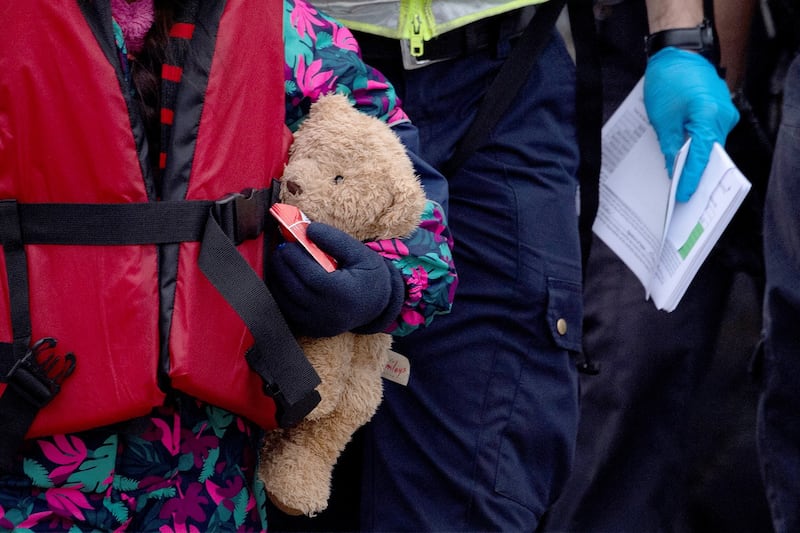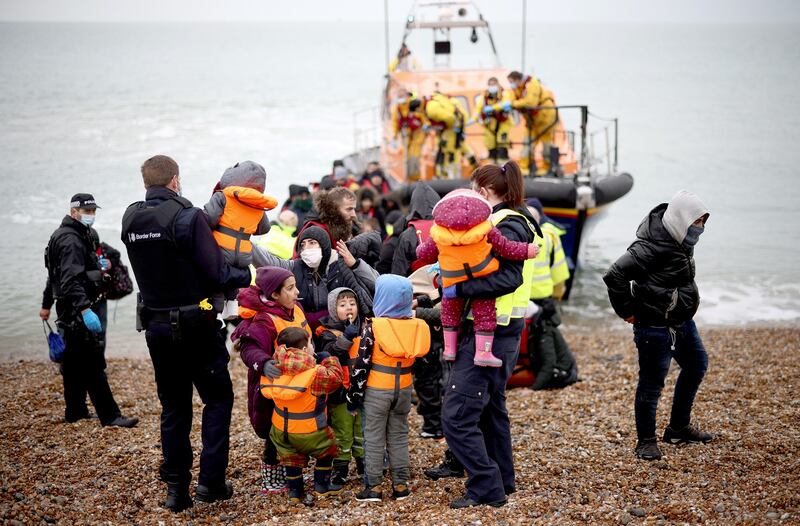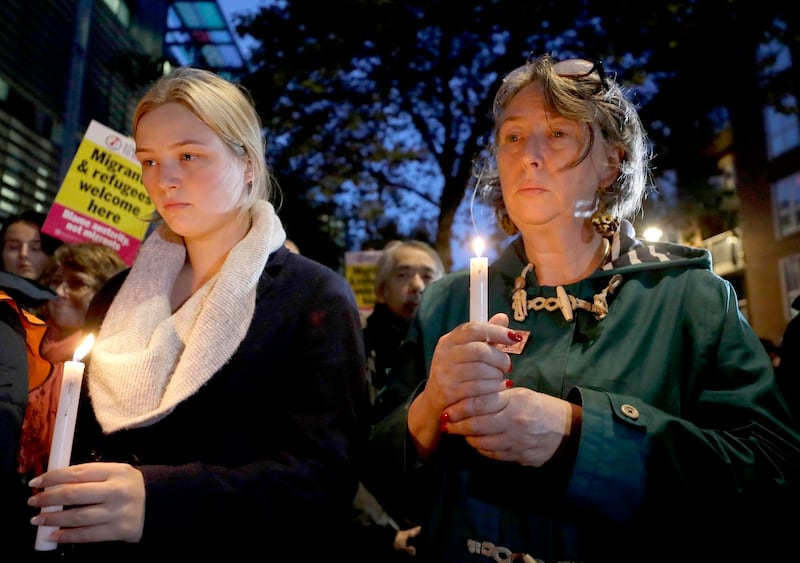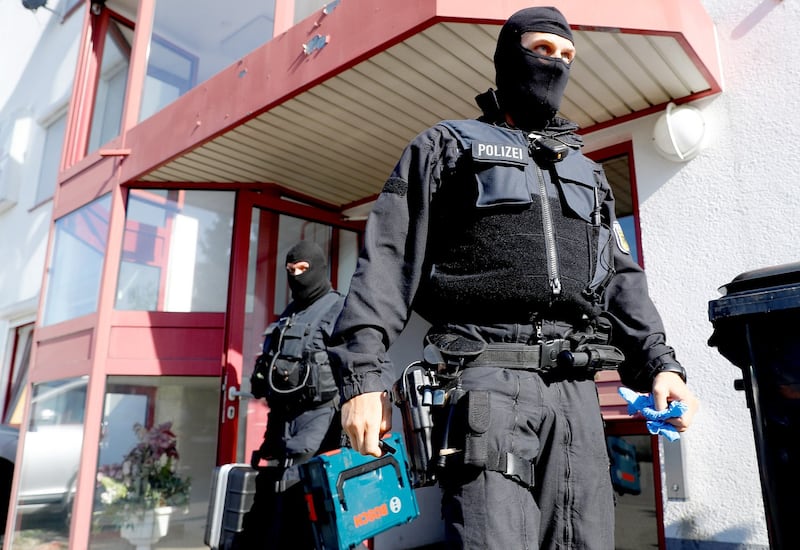The phone rang in the middle of the night at a small apartment on the outskirts of London, waking Tim Tran as he was sleeping. But what the caller on the other end of the line relayed, woke him from his daze immediately and he got ready to go to work.
Tim Tran, a pseudonym he has asked RFA to use to protect his identify, has lived in the United Kingdom for several decades. For the past seven years, he has provided support for England’s social services and the police in cases involving victims of human trafficking from Vietnam.
That early morning, staff from Britain’s Department of Health and Social Care told him two boys from Vietnam had been arrested at London’s Heathrow Airport. Tran was asked to come to the office to assist with the case.
“When I arrived, there were the police, social care officers and others. The two boys were so relieved when I entered the room, because they could see I was Vietnamese. They only spoke a couple of words of English,” he said.
They were sweet and friendly, about 15 years of age, Tran recounted. They had arrived on a flight in the middle of the night, but instead of getting their luggage and exiting the airport, they hung around with seemingly nowhere to go. When customs approached and questioned them, they couldn’t answer.
Tran interviewed the boys and noted one important detail: The boys did not travel alone.
“The two boys said they posed as children of a Vietnamese diplomat to travel by plane to England. All three had visas from the British government to legally enter at Heathrow airport. They said once they arrived, the diplomat who posed as their dad took all their documents and disappeared.”

Policies and treatment of minors
In 2009, the U.K. expanded its Children Act 2004 and enacted a new law under the Borders, Citizenship and Immigration Act to add the U.K. Border Agency to the list of government bodies required to safeguard and promote the welfare of unaccompanied minors.
The case of the two boys found at Heathrow would end up being adjudicated as a case of human trafficking. The children were placed in foster care and allowed to stay in Great Britain.
“The U.K. Children’s Act (of 2004) makes it very clear that it does not matter if the child is a victim of human trafficking or a victim of domestic violence, or whatever. The blame for the illegal action lies at the feet of the adults. The British government considers the children innocent. That’s what makes England progressive and it’s admirable,” said Tim Tran.
“Maybe it’s because of this act that so many people choose to come to the U.K.?” he pondered.
According to data from the Ministry of Justice, in 2010 there were 187 victims of human trafficking who were minors, representing about a quarter of the total number (710) of trafficked people in the U.K. By 2018, the percentage of trafficking victims who were minors rose to 45% (3,128) of a total of 6,985 victims. But experts say the true number of victims, and likely the proportion of child victims, is much higher.
The Council of Europe’s Group of Experts on Action against Trafficking in Human Beings (GRETA) in a 2016 review of Britain’s efforts to fight modern slavery highlighted a persistent phenomenon among minors, similar of the incident Tim Tran described at Heathrow airport: “A recurrent pattern is for unaccompanied minors to be left by traffickers in transit at the airport, before picking them up from where they have been accommodated by the local authorities.”
It was a way for smugglers to get people into the country, Tran explained. Then they’d pick up the kids from the shelter home or wherever they were placed, and continue the journey they had originally planned.

Trafficking victims persecuted as perpetrators
A migrant who is connecting with smuggling rings to help him or her cross borders illegally might be seen as a willing participant of a crime. In the eyes of many, including the laws of various countries, they can still be seen as perpetrators, even when they have been exploited or abused, says Kevin Hyland, a former independent anti-slavery commissioner for the U.K. He now is a member of GRETA.
“They're looked upon as illegal immigrants and therefore are dealt with in a very robust way,” for example with deportation, he said. “Across Europe and in the U.K. specifically, I know it's a problem. What happens when Vietnamese nationals are found in, say, a cannabis farm, is that they are very often arrested.”
Even when these “farm hands” are held in prison-like conditions, unable to leave the premises and with neither the financial nor language capabilities to run large, multi-million cannabis operations, the law might be slow to recognize them as victims. That was the case of a woman arrested at a farm in Dublin in 2012, Hyland said.
“This was a young Vietnamese woman who couldn't speak English, who was on the premises and her role was to keep the plants watered. It was beyond her capability to be able to go and rent this very large property, set up this network. But she was charged with the offence of manufacturing the drugs or cultivating the drugs.”
The woman was jailed for two and half years before the Supreme Court of Ireland recognized her as a victim of human trafficking.
The case illustrates the difficulties in identifying victims of human trafficking. In 2009, the U.K. established the National Referral Mechanism with the goal of identifying and supporting victims of modern slavery. Hyland says it’s a laudable effort, with first responders referring more victims into the system every year, but it falls short in getting justice and help for the victims.
“The waiting list, including a large number of Vietnamese nationals, is currently running at about 22,000 waiting for entry into the system. Those people will have been waiting one to two years, some even more. Sometimes it’s four years,” he said.
“So what's happening is the victims are not being identified and the criminals are operating with impunity. And there's a lot of money being made out of this and Vietnamese nationals are seen as a good source of income.”

Even in the incident that would kill 39 Vietnamese migrants in October of 2019, nobody has been convicted of human trafficking. Essex police recently charged Dragos Stefan Damien, the man who provided the lorry in which the victims perished, with conspiracy to assist unlawful immigration. Damien was caught in Milan, Italy, on June 10 and extradited to the U.K. where he pled guilty earlier last month.
Court records show that the gang involved in the Essex 39 tragedy had a long-standing smuggling operation and profited £1 million (U.S. $1.35 million) in that month alone.
In the aftermath of the tragedy, crime operations have even used the tragedy to continue to recruit migrants, and bolster their bottom lines.
“People that are organizing this in Vietnam, they've actually used the deaths of the 39 people as a promotion type, by saying, ‘Yes those were the bad smugglers. They were the bad people to get you there. We do it properly. We can charge a little bit more but you'll get there safely,’” said Hyland.

Fighting a multi-million dollar business
The smuggling of Vietnamese nationals continues to be a lucrative $300 million business, the Council of Europe estimates. The complex network across Europe where each stage, each country, might be run by a different group, can make prosecution that much harder.
For Hyland the number of prosecutions is “shockingly low.” The solution needs to be a two-pronged approach: Targeting businesses that profit directly or indirectly from unlawfully cheap labor and exploitation, and educating vulnerable populations in the source country.
“If we really want to tackle human trafficking, we need to start hitting businesses, landlords, transport companies, whoever it may be, including countries. We need to hit them about the money that they make from this enterprise,” he said.
The 2015 U.K. Modern Slavery Act aims to tackle the problem by requiring companies to show that modern slavery is not taking place in their business operations or their supply chains.
In Germany, the Federal Police Office is trying to combat human trafficking by going after other crimes connected to it.
“For us it is very important that the different manifestations of this type of crime aren’t considered separately, but seen as a whole and connected. That means that we don’t consider smuggling as a separate crime, or human trafficking, or the illegal sale of cigarettes, as separate crimes,” said Chief Detective Nicole Baumann of the German Federal Police Office. Many Vietnamese illegals can be seen peddling cigarettes at busy commercial centers.
“We have to try to look at these forms of crime as under one roof, and every agency has to be practically involved in the prosecution.”
Germany’s federal police agents work closely with state police and customs and border agencies, youth welfare offices, even unions and professional counseling services, expanding control activities that could uncover human trafficking crimes. A key element for German law enforcement is to involve and cooperate with NGOs who provide cultural training and other forms of collaboration, and work with the government of the source country, Chief Detective Baumann said.
“Our efforts have got to go across agencies and be multi-disciplinary in order to successfully combat this crime,” Baumann said.
While tackling the demand for illegal and forced labor in Europe, anti-modern slavery experts agree, any approach to combat trafficking from Vietnam must tackle conditions in the source country, such as few educational or economic opportunities, that are pushing citizens to leave their homes and risk becoming trafficked.
Until governments start to take control of the options provided for their citizens, by providing education, training for work, and properly paying jobs, it will be difficult to stem the flow of migrants seeking better opportunities elsewhere. That is a challenge not unique to Vietnam, said anti-slavery advocate Kevin Hyland.

